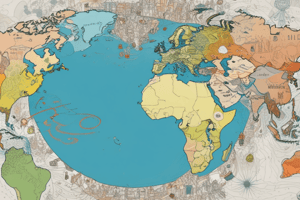Podcast
Questions and Answers
What does globalization affect in the context of nation-states?
What does globalization affect in the context of nation-states?
The dynamics of nation-states and their agency as legitimate holders of force within their jurisdiction.
What was the main mission of the United Nations when it was established?
What was the main mission of the United Nations when it was established?
- To uphold international laws only
- To maintain international peace and security (correct)
- To support specific nations against others
- To promote economic development
Which of the following is NOT one of the six organs of the United Nations?
Which of the following is NOT one of the six organs of the United Nations?
- The Court of Appeals (correct)
- The International Court of Justice
- The Security Council
- The General Assembly
Globalization is seen to impose a forced choice upon nation-states: either they conform to the __________ ideas and free-market principles or risk being left behind.
Globalization is seen to impose a forced choice upon nation-states: either they conform to the __________ ideas and free-market principles or risk being left behind.
The United Nations has the task of administering international oversight for trust territories.
The United Nations has the task of administering international oversight for trust territories.
What is the goal of the ASEAN Free Trade Area (AFTA)?
What is the goal of the ASEAN Free Trade Area (AFTA)?
The statehood of European Union members is dissolved by joining the organization.
The statehood of European Union members is dissolved by joining the organization.
Flashcards are hidden until you start studying
Study Notes
The State, Nation, and Nation-State
- Weber (1997) defines the state as a compulsory political organization with a centralized government that legitimately uses force within its territory.
- A nation emphasizes shared identity (ethnicity, language, religion, etc.) fostering loyalty and belonging (Schattle, 2014).
- A nation-state combines these, forming a political community legitimately executing peace, rooted in civic society.
- While some argue globalization diminishes nation-state power (Appadurai, Ohmae), nation-states retain agency, manipulating competitive advantages in international relations.
- The UN's 194 member states demonstrate globalization's impact on nation-states, despite their continued role as legitimate force holders.
The United Nations (UN)
- Established post-World War II, its primary mission is maintaining international peace and security.
- Additional functions include: protecting human rights, delivering humanitarian aid, promoting sustainable development, and upholding international law.
- Six principal organs: General Assembly, Security Council, Economic and Social Council, Trusteeship Council, International Court of Justice, and Secretariat.
Globalization's Impact on Nation-States
- Globalization presents nation-states with a choice: adopt neoliberal principles (deregulation, privatization, free trade) or risk developmental stagnation.
- Consequently, nation-states often realign policies to align with global free-market principles, facing pressure from multinational corporations.
- Example: ASEAN Free Trade Area (AFTA) established in 1999 to deepen economic collaboration among Southeast Asian nations.
- Economic and political integration is another effect. The European Union (EU) exemplifies a supranational body with a common currency (in 17 states), parliament, citizen rights, crisis resolution mechanisms, and a judicial system, without dissolving member statehood.
- The text mentions a third effect but does not describe it.
Studying That Suits You
Use AI to generate personalized quizzes and flashcards to suit your learning preferences.




